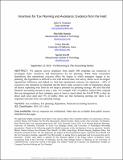Incentives for Tax Planning and Avoidance: Evidence from the Field
Author(s)
Graham, John R.; Hanlon, Michelle; Shevlin, Terry; Shroff, Nemit
DownloadHanlon_Incentives for.pdf (548.1Kb)
OPEN_ACCESS_POLICY
Open Access Policy
Creative Commons Attribution-Noncommercial-Share Alike
Terms of use
Metadata
Show full item recordAbstract
We analyze survey responses from nearly 600 corporate tax executives to investigate firms' incentives and disincentives for tax planning. While many researchers hypothesize that reputational concerns affect the degree to which managers engage in tax planning, this hypothesis is difficult to test with archival data. Our survey allows us to investigate reputational influences and, indeed, we find that reputational concerns are important—69 percent of executives rate reputation as important and the factor ranks second in order of importance among all factors explaining why firms do not adopt a potential tax planning strategy. We also find that financial accounting incentives play a role. For example, 84 percent of publicly traded firms respond that top management at their company cares at least as much about the GAAP ETR as they do about cash taxes paid and 57 percent of public firms say that increasing earnings per share is an important outcome from a tax planning strategy.
Date issued
2013-12Department
Sloan School of ManagementJournal
The Accounting Review
Publisher
American Accounting Association
Citation
Graham, John R., Michelle Hanlon, Terry Shevlin, and Nemit Shroff. “Incentives for Tax Planning and Avoidance: Evidence from the Field.” The Accounting Review 89, no. 3 (May 2014): 991–1023.
Version: Author's final manuscript
ISSN
0001-4826
1558-7967